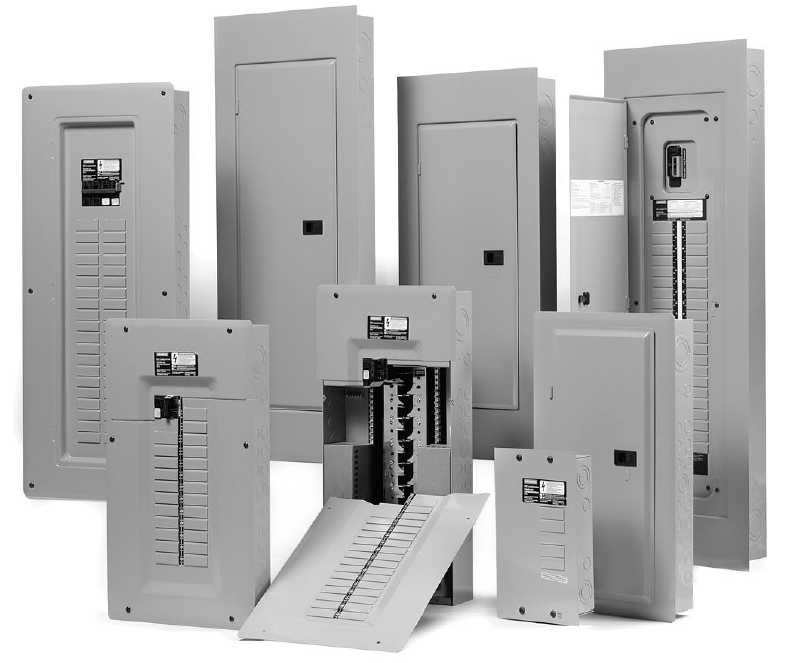Electrical Panels: What Every Homeowner Should Know
Trusted Installation, Repair, Replacement and Maintenance by The Wire Doctors, Licensed Electricians in PA & NJ
The electrical panel—also known as a breaker box or service panel—is the heart of your home’s electrical system. Every bit of electricity that powers your lights, outlets, appliances, and HVAC flows through this critical box. When it fails, the results can range from flickering lights to serious fire hazards.
At The Wire Doctors, we help homeowners across Pennsylvania and New Jersey understand, maintain, and replace their electrical panels to keep their homes powered safely and reliably.
What an Electrical Panel Does
The electrical panel is your home’s central connection point to the power grid. It takes electricity from the utility service and distributes it through branch circuits to power everything from your kitchen outlets to your HVAC system. Inside the panel, you’ll find individual circuit breakers—or in older homes, fuses—each responsible for one part of the house.
This panel is owned and maintained by you, the property owner. If it’s damaged, outdated, or overloaded, it’s your responsibility to repair or replace it—not the utility company’s.
Types and Sizes of Panels
Panels are rated by amperage—the amount of electrical current they can safely handle. Here’s what that looks like in practice:
-
100 amps – Common in older homes, but often insufficient for modern needs
-
150 amps – Better for homes with multiple major appliances or additions
-
200 amps – Standard for most newer homes or homes over 2,000 sq. ft.
-
400 amps – For large homes, high-end appliances, EV chargers, or outbuildings
Homes built between 1950–1965 may still use 60-amp fuse boxes, which are considered outdated and a fire risk.
If you’re unsure what size panel your home needs, The Wire Doctors can inspect your setup and make recommendations based on your home’s electrical demands and future plans.
Where to Find the Panel
Electrical panels are typically located out of the way, in places such as:
-
Garages (most common)
-
Basements
-
Utility closets or pantries
-
Hallways leading to exterior doors
-
Exterior walls (especially on older homes)
If you’re trying to locate your panel, look for the area where utility lines enter your home. The panel is usually just inside or directly beneath that location.
Common Signs You Need Panel Repair or Replacement
Electrical panels don’t last forever. On average, a panel will last 25 to 40 years, but signs of wear may appear much sooner, especially in homes with increasing power demands. You may need panel work if you notice:
-
Frequent breaker trips or blown fuses
-
Flickering or dimming lights
-
A panel that’s hot to the touch
-
Visible rust, burn marks, or strange sounds
-
Outlets or switches that no longer work reliably
-
A need for more circuits than your panel allows
In these cases, our licensed electricians can inspect your system, diagnose the issue, and determine whether repair or full replacement is required.
What’s Inside an Electrical Panel
A typical service panel includes the following components:
-
Panel door – The outer metal swing cover
-
Main breaker – A large switch that can shut off all power inside the home
-
Individual breakers – Switches controlling each circuit (15–20 amps each)
-
Lugs – Large terminals that bring utility power into the panel
-
Branch wires – Wires that deliver power to different areas of the home
-
Spare slots – Empty spaces that allow for future circuit additions
Panels come in both single-phase (residential) and three-phase (commercial) configurations. The Wire Doctors works with both types.
Expanding Your Electrical Capacity
Need more breakers? If your panel still has open slots, we may be able to install additional circuits. However, in older or already maxed-out panels, the solution is to:
-
Install a larger main panel (e.g., upgrade from 100A to 200A)
-
Add a sub-panel to handle specific areas or appliances
-
Use tandem breakers (where allowed) to fit more circuits into the same space
Every home’s needs are different—let us help you determine the safest, most cost-effective option.
Electrical Panel Safety
Panels are built for safety, but working inside them is not risk-free. Even when you shut off the main breaker, live voltage remains on the incoming lines and lugs. Here’s what we always recommend:
-
Never touch the service wires or lugs—they remain live, even when the panel is off
-
Never work with the protective panel cover removed unless you are trained
-
Use only insulated tools and wear protective gear
-
Leave panel upgrades or replacements to licensed electricians
We routinely hear from homeowners who began a DIY panel project and realized halfway through it was too dangerous or complex. Call us first—we’ll get it done safely, cleanly, and up to code.
Cost of Panel Repair or Replacement
The cost to upgrade or replace an electrical panel depends on the amperage, condition of the existing wiring, and whether additional circuits or equipment are involved. We provide transparent pricing and walk you through every step before starting any work.
Trusted Across Pennsylvania and New Jersey
The Wire Doctors is fully licensed and insured to perform electrical work in both states:
-
PA Home Improvement Contractor Registration: PA147302
-
NJ Electrical Contractor License: 34EB01305800
We’ve worked with thousands of homeowners across the region to ensure their homes are safe, compliant, and ready for modern power needs.
Need Electrical Panel Help? Contact Us Today.
Whether you’re upgrading an older fuse box, adding new appliances, or experiencing flickering lights and tripped breakers, The Wire Doctors is here to help.
Call (800) 373-7005 or visit thewiredoctors.com to schedule your electrical panel service in PA or NJ.
Call The Wire Doctors, serving PA & NJ for help with:
- Main Panel Replacement
- Fuse Box Replacement
- Main Panel Repair & Rejuvenation
- Sub Panels
The Wire Doctors
📍 301 Oxford Valley Rd, Yardley, PA
📞 (800) 373-7005 (24/7 Emergency Line)
🌐 thewiredoctors.com
Pennsylvania Counties Served
Columbia County, PA
New Jersey Counties Served
If you need electrical panel services in the Greater Pennsylvania area, you’ve come to the right place. The Wire Doctors has been providing trusted electrical services to the local community for years. When electricity enters your home, it passes through your electrical panel. Many systems in your home won’t work when the panel malfunctions. If you have breakers frequently being tripped, or if you see that some outlets in your home are not working, it’s time to call the professional electricians at The Wire Doctors.
When to Have Electrical Panel Services Performed
Circuit breakers regulate the amount of electrical energy that flows into a circuit. If a circuit is overloaded, the breaker trips and shuts down the electricity flow. You might have encountered this, if on the same circuit you had multiple devices running at once. You can fix this by unplugging the device and resetting the breaker. If this is something that happens regularly, then you need to have a technician replace it with a new one and get a professional recommendation on how to prevent this from continuing in the future. If there is only a breaker for those trips, then you may just have to replace that bad breaker.
Signs that Your Electrical Panel Needs to be Replaced
- The panel is warm or hot to the touch
- Lights flickering when appliances are in use
- Hissing sound
- Burning smell coming from the panel
- Burn marks in panel
- Popping or other noises coming from the breaker box
- Melted electrical wires
Fuse Panels
Most homes built before 1960 used fuse-style panels to manage electrical circuits. When circuit breaker panels became more prevalent, fuse panels started to be considered unsafe. Fuse panels are not, in themselves, danger. The issue with fuse panels is that it is too easy to oversize the fuse for the circuit. Many people started to use larger-rated fuses to replace fuses that frequently went bad due to too much load on them. What people don’t realize is that the fuse is paired to the size of the wire used for the circuit. The larger a wire is, the greater the current it can handle without generating too much heat. When too much current is put across a wire, it works like an element in an oven and gets hot, which can create a fire hazard. A breaker is more difficult to change and should be done so by a licensed electrician who should not install a breaker that has a capacity greater than what the circuit wire can handle. Instead, the electrician should divide the circuit into two and add a breaker to your panel. This is not possible with a fuse panel because they are typically not expandable.
Electrical Panel Replacement in Pennsylvania
Does it seem like you are always running to the breaker box every time someone plugs in an appliance? Are you looking for ways to upgrade your electrical system to accommodate your family’s technological lifestyle? Then it may be time to invest in an electrical panel replacement. Some property owners choose to replace their existing panels for convenience and efficiency, while others simply want to avoid further electrical hazards. No matter what reason you have for making the switch, our specialists are ready to put their tools to work to ensure that your system can handle the needs of your household or business.
Want More Information About Electrical Panels?
Call Us at 800 373 7005
F.A.Q.
Frequent Questions
What is an electrical service panel?
Electrical panels go by many names: breaker panels, load centers, service panels, or breaker boxes. The steel enclosure holds your home’s circuit breakers. When needed, circuit breakers or “trip” the circuits that carry power throughout your home to prevent damage to electrical wiring or fire.
When should I replace my electrical panel?
Electrical service panels should be replaced every 20 to 30 years. If you’ve been in your home that long, or if you moved into an existing home, your panel may be outdated.
What are the different types of electrical panels?
There are 4 different types of electrical panels – the main breaker panel, fuse boxes, main lug panels, and subpanels. The main breaker panel is the mother of all the panels in your house. It regulates circuit breakers and electricity consumption within the home.
Can I install a 200-amp panel with 100-amp service?
Yes, a 100-amp breaker can be put into a 200-amp panel to replace the 200-amp breaker. The rating of the panel is the highest amperage allowed. You’re also allowed to use a smaller breaker and smaller amperage.


